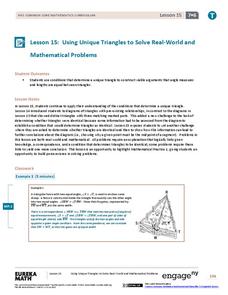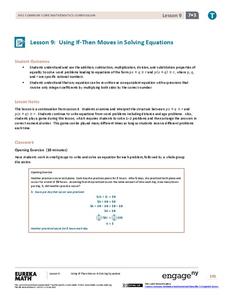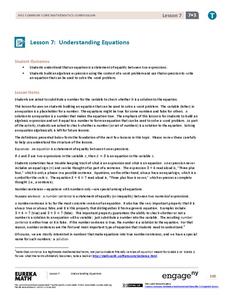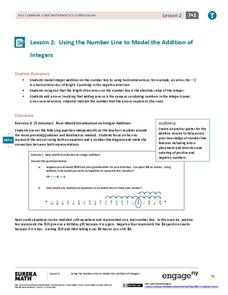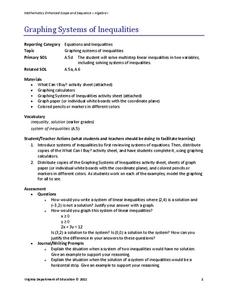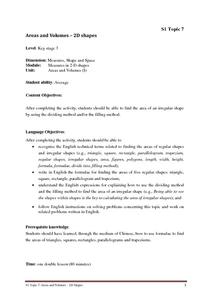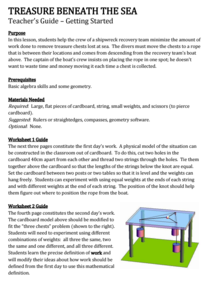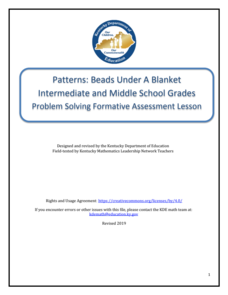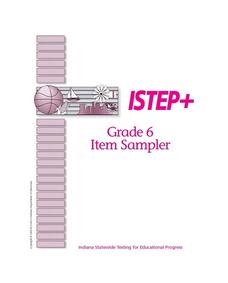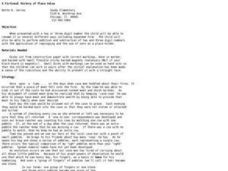Reardon Problem Solving Gifts
Teaching Problem Solving Strategies in the 5-12 Curriculum
Address any kind of math concept or problem with a series of problem-solving strategies. Over 12 days of different activities and increasing skills, learners practice different ways to solve problems, check their answers, and reflect...
EngageNY
Volume of Right Prisms
Apply volume and area formulas to find the volume of any right prism. The 26th lesson of a 29-part module examines methods for finding the volume of right prisms with varying shapes of bases. Learners use the formula V = Bh to find...
EngageNY
Slicing a Rectangular Prism with a Plane
What do you get when you slice a prism? Pupils discover that the answer depends on how the prism is sliced. The second half of the 29-part module focuses on three-dimensional objects. Learners use their two-dimensional vocabulary and...
EngageNY
Using Unique Triangles to Solve Real-World and Mathematical Problems
How can congruent triangles help mark a soccer field? This is just one question your classes can answer after solving the real-world problems in the lesson plan. Each example posed through a word problem elicits higher-order thinking and...
EngageNY
Collecting Rational Number Like Terms
Teach pupils to handle fractions fluently. The sixth installment in the series of 28 has class members apply the concepts learned in previous lessons to expressions with fractional coefficients. The fractions are both mixed numbers and...
EngageNY
Solving Inequalities
Investigate complex problem situations by applying inequalities. Building from concepts explored in the previous lesson plan, learners read word problems and develop inequalities to represent the situation. They then solve the...
EngageNY
Using If-Then Moves in Solving Equations II
Continuing from the previous lesson in the 28-part series, learners write equations to model problem situations. They then solve the problem by applying the properties of equality. In contrast to the previous lesson, they do not write...
EngageNY
Understanding Equations
After examining expressions in the first six lessons of the series, learners are now ready to apply those concepts to create equations in the seventh installment of 28. Each exercise contains a conceptual situation that helps build an...
EngageNY
Generating Equivalent Expressions II
Discover how to apply the commutative and associative properties to generate equivalent expressions. The second lesson in the 28-part module asks pupils to rearrange an expression by grouping like terms. From there, they can combine...
EngageNY
Using the Number Line to Model the Addition of Integers
The second lesson in a series of 25 shows the class how to use arrows and a number line to add integers. Learners apply their knowledge of the commutative property and absolute value in their explanations. Classmates play the integer...
Texas Instraments
Getting Started Dilemma
Get out those thinking caps and apply graphing functions to a real-world problem. Use the TI-83 graphing calculator to evaluate algebraic expressions that are imbedded in a series of real-world scenarios. A great lesson!
Virginia Department of Education
Inductive and Deductive Reasoning
Introduce pupils to the two types of reasoning, inductive and deductive. Classmates work in pairs or small groups to learn the difference between the two and apply these reasonings to develop valid conclusions.
Virginia Department of Education
Graphing Systems of Inequalities
Apply systems of inequalities to a real-world problem. Here, scholars learn to graph solutions to systems of linear inequalities. To finish the lesson, they solve a problem involving burgers and cheeseburgers using a system of inequalities.
Government of Hong Kong
Areas and Volumes - 2D Shapes
Unfortunately for young mathematicians, the world isn't made entirely of parallelograms, triangles, and trapezoids. After first learning the area formulas for these common shapes, students apply this new knowledge to...
California Mathematics Project
Treasure Beneath the Sea
Explore the geometry of treasure hunting! Learners use geometry to design a treasure recovery strategy. The objective is to create a design that minimizes the amount of work required. Budding mathematicians use properties of triangles as...
Kentucky Department of Education
Patterns: Beads under a Blanket - Intermediate and Middle School Grades
Apply pattern knowledge to bead patterns. The formative assessment lesson provides pupils the opportunity to show what they know about patterns and functions. Learners take a pre-assessment, then build upon their answers at the beginning...
Buffalo State
Adding and Subtracting Integers Unit
Just because one integer is larger than another doesn't mean it will make sense right away. Go beyond note taking and show learners, through the use of algebra tiles and a Four-Pan Algebra Balance, how the numbers relate to one...
EngageNY
Solutions to Polynomial Equations
Take a step back to Algebra II. The first lesson in a series of 23 asks scholars to remember working with quadratic equations with complex solutions. Pupils apply polynomial identities to complex numbers and work examples that show how...
Curated OER
Analyzing Equations Through Slope and Y-int
With problems applying to modern-day topics like Netflix and McDonald's, math whizzes analyze graphs and investigate the slopes. In this algebra worksheet, learners identify the slope and y-intercept of the given equations. They graph...
Illustrative Mathematics
What is a Trapezoid? (Part 2)
This collaborative activity investigates the meaning of a trapezoid and a parallelogram. It begins by presenting two different definitions of a trapezoid. Learners are to reason abstractly the difference between the two definitions and...
Curated OER
ISTEP + Grade 6 Item Sampler
In this cross-curricular sampler of worksheets, students determine the meaning of specialized vocabulary and to understand the precise meaning of grade-level-appropriate words, describe and connect the essential ideas, arguments, and...
Curated OER
A Fictional History of Place Value
Your class can explore standard and expanded notation, as well as computation with regrouping. They listen to a make-believe story about cavemen and the origin of numerals and place value. Then apply what they learned about renaming and...
Curated OER
Lemonade For Sale
2-3rd graders listen to the story, Lemonade for Sale, by Stuart J. Murphy. In the story, children produce and sell lemonade to raise money for their clubhouse, create a product, classify the resources used in production as natural...
Curated OER
Snow Day
It's a snow day, and two brothers attending schools with different schedules each got a late start to the day. But who had the shorter school day? That's what your class will find out as they apply their knowledge of fractions to this...
Other popular searches
- Grade 9 Applied Math
- Applied Math Weight
- Applied Math Blueprint
- Applied Math 20
- Worksheets Applied Math
- Applied Mathematics
- Applied Math Parallel
- Applied Math Electricity
- Applied Math Exam
- Applied Math for Aviation
- Applied Math Store
- Applied Math Conservation



